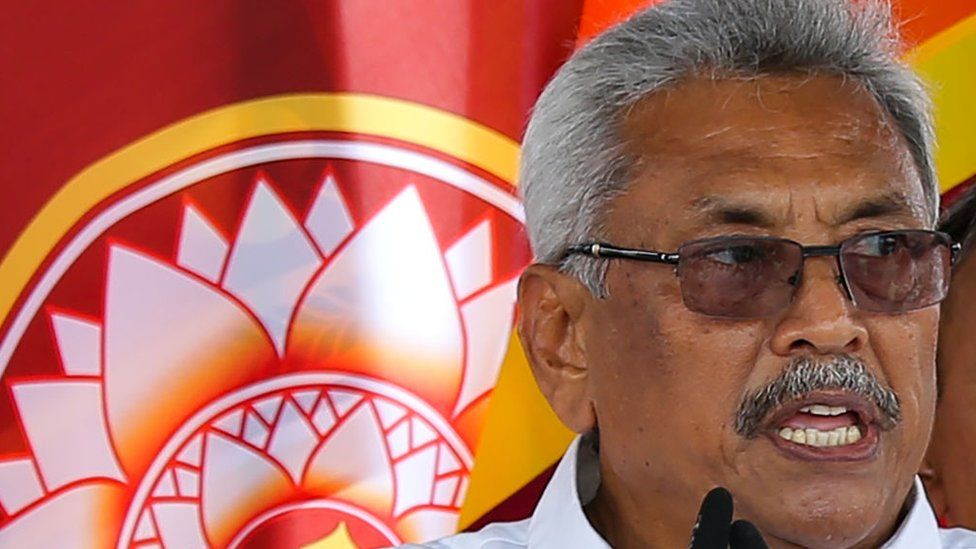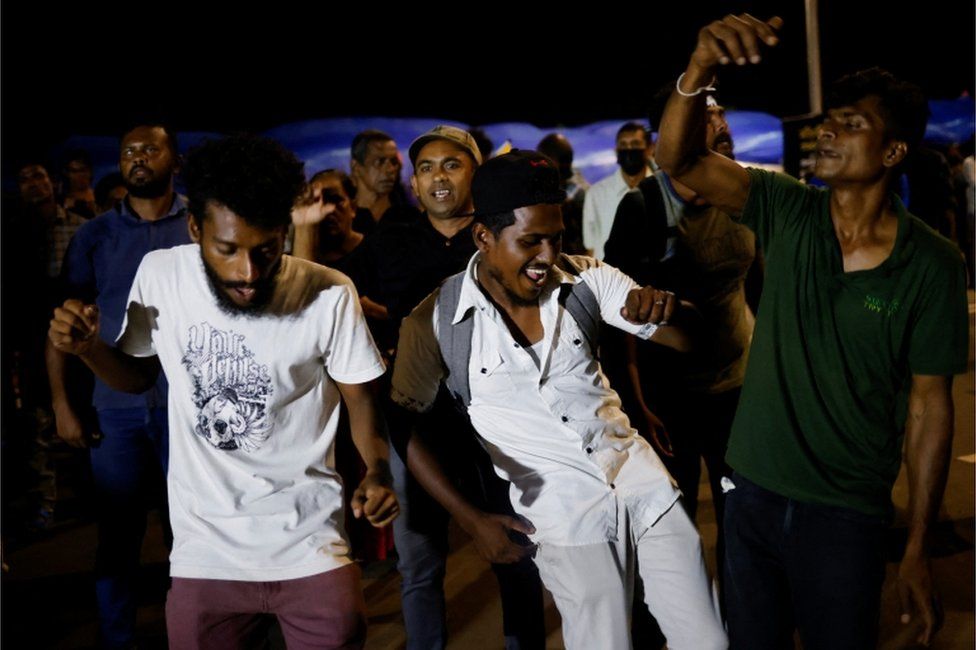Gotabaya Rajapaksa has resigned as president of Sri Lanka after fleeing to Singapore in the face of mass protests at home over his rule.
He is believed to have wanted to leave Sri Lanka before stepping down in order to avoid the possibility of arrest under a new administration.
The cost of food, fuel and other basic supplies has soared for Sri Lankans.
In the capital Colombo, delighted demonstrators greeted news of the president’s departure with dancing.
Mr Rajapaksa arrived in Singapore after first flying to the Maldives on Tuesday night. Reports say he is accompanied by his wife and two bodyguards.
Singapore’s foreign ministry said Mr Rajapaksa had not asked for asylum or been granted asylum. “Singapore generally does not grant requests for asylum,” it added.
The acting president, Ranil Wickremesinghe, does not formally become interim president until he is sworn in.
Once sworn in he has 30 days for parliament to endorse him. If they do not, MPs need to hold a vote for a new president.
 IMAGE SOURCE,GETTY IMAGES
IMAGE SOURCE,GETTY IMAGESThe resignation letter was sent by email to the speaker of parliament, who said he would complete legal processes and announce it officially on Friday.
Mr Wickremesinghe on Thursday imposed a curfew for a second day. His government ordered a curfew from noon (06:30 GMT) to 05:00 Friday to quell protests.
The streets of Colombo were calmer as anti-government demonstrators began leaving some of the official buildings they had occupied.
“We are peacefully withdrawing from the presidential palace, the presidential secretariat and the prime minister’s office with immediate effect, but will continue our struggle,” said a spokeswoman for the protesters.
Mr Wickremesinghe was appointed acting president by President Rajapaksa after the latter fled – but the decision triggered further protests demanding the PM also resign.
One person died and 84 others were injured during Wednesday’s protests, which took place at key landmarks around the capital, Colombo, including the prime minister’s office.
Who will let him stay?
Analysis by Tessa Wong, Asia Digital Reporter in Colombo
Many are asking where Gotabaya Rajapaksa is planning to flee to next. But perhaps the more important question is: who will let him stay?
It is unclear if Singapore is a transit point on the way to the Middle East, or if he intends to stay in the Southeast Asian island, and if so, for how long.
But sources say it is doubtful the Singapore government will allow him to stay for long
The rich city state has in the past played host to controversial figures such as Thein Sein, Robert Mugabe and Kim Jong-un. But harbouring Mr Rajapaksa for the long term is likely to be a line they will not cross.
This is a man accused of war crimes, under intense global scrutiny right now, having gone on the run while his country slides into economic collapse. The international criticism that Singapore would receive would not be worth it.
Authorities would also have to contend with the backlash from the Singapore public, which in recent years has become more vocal and assertive.
The country also has a significant Tamil population, some of whom are of Sri Lankan heritage. Mr Rajapaksa is accused of allowing the deaths of tens of thousands of Tamil civilians during the civil war while he was defence secretary.
Many Tamil Singaporeans would be made furious by his presence, which would in turn rock the peace that authorities have painstakingly maintained.
In short, the longer Mr Rajapaksa stays in Singapore, the bigger the headache for authorities. And it may be a headache they would rather do without.
Major demonstrations since April over the country’s economic crisis escalated after protesters broke into the presidential palace on Saturday and set fire to the prime minister’s private home.
On Wednesday, police fired tear gas at protesters attempting to break down the gates of the prime minister’s office in Colombo, before finally forcing their way in. They later headed for parliament but did not get in.
Watch: Police fire tear gas at Sri Lanka protesters as they storm PM’s office
By Thursday, protesters had handed back the president’s official residence to the authorities when the BBC visited. There were no protesters at parliament on Thursday afternoon, a BBC correspondent confirmed.
“We captured this building to show people power. We give it back the way we captured it and leave. We will come back in the next minute if needed,” Danish Ali, a protester at the prime minister’s office, told BBC Tamil.
Many blame the Rajapaksa administration for mishandling the crisis and see Mr Wickremesinghe, who became prime minister in May, as part of the problem.
The president’s departure has created a threatening power vacuum in Sri Lanka, which needs a functioning government to help dig it out of financial ruin.
Politicians from other parties have been talking about forming a new unity government, but there is no sign they are near agreement yet. It’s also not clear whether the public will accept what they come up with.
Under the constitution, it’s the prime minister who should act in the president’s stead if the latter resigns.
Source: BBC News


